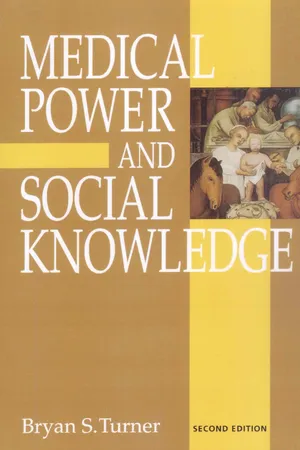
- 288 pages
- English
- ePUB (mobile friendly)
- Available on iOS & Android
Medical Power and Social Knowledge
About This Book
The fully revised edition of this successful textbook provides a comprehensive introduction to medical sociology and an assessment of its significance for social theory and the social sciences. It includes a completely revised chapter on mental health and new chapters on the sociology of the body and on the relationship between health and risk in contemporary societies.
Bryan S Turner considers the ways in which different social theorists have interpreted the experience of health and disease, and the social relations and power structures involved in medical practice. He examines health as an aspect of social action and looks at the subject of health at three levels - the individual, the social and the societal. Among the perspectives analyzed are: Parsons? view of the `sick role? and the patient?s relation to society; Foucault?s critique of medical models of madness and sexuality; Marxist and feminist debates on the relation of health and medicine to capitalism and patriarchy; and Beck?s contribution to the sociological understanding of environmental pollution and hazard in the politics of health.
Frequently asked questions
Information
Table of contents
- Cover Page
- Title Page
- Copyright Page
- Dedication
- Contents
- Acknowledgements
- I Introduction
- II Concepts of Disease and Sickness
- III Social Organization of Medical Power
- IV Conclusion
- References
- Index